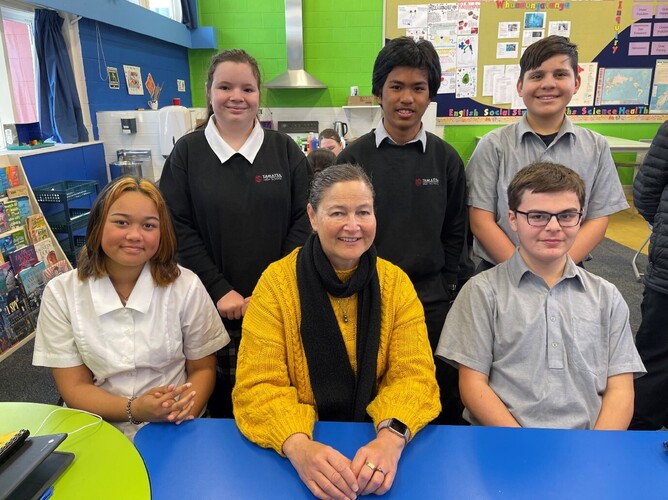Tamatea High School is planning for all of their Year 9 classes in 2022 to be homerooms. Deputy Principal, Nicky Anderson oversees junior school learning and is a strong advocate of the homeroom system.
Whaea Nicky says ‘Our homeroom students have the same teacher for their core subjects and other teachers for their option subjects. Instead of having 8 different teachers a week, they typically only have four. This means the transition from intermediate isn’t such a huge leap. The students find it much more settling to stay in the same room most of the time and have the learning integrated instead of broken into silos like the traditional approach. The best thing about homerooms is the depth of relationship that HoY the students develop with their teacher and classmates. There’s a real sense of belonging which is such an important foundation for their learning.’
The teachers at Tamatea High School have found the Year 9 students in the homerooms are more settled than students who must change every hour and the learning is better. Whaea Nicky says that is the reason that all Year 9 classes will be homerooms in the coming year and the school will be looking to employ another teacher to join the other 3 homeroom teachers.
The other positive of the homeroom classes is that the teachers share the planning load which increases efficiency and creativity. ‘The programmes our homeroom teacher team have put together this year are strongly informed by student voice. We’ve done cool things like visiting the Ātea-ā-rangi (star compass), the Raukawa Bay tree sanctuary, Otātara pā and the Fish and Game facility with the opportunity to integrate learning in exciting student driven team projects. This is much more aligned to what happens in the workplace – problem-solving in teams, developing communication skills, planning, and self-organising.’ Whaea Nicky adds.
Principal, Robin Fabish, says ‘One of the real beauties of homeroom classrooms is the scope for differentiated learning. Advanced learners can fly and those that need support can also be catered for. Projects can be adjusted to meet the learning needs and levels of all students without having to use streaming. A recent report about streaming has raised serious questions about the practice. The problem with streamed classes is that the students call the bottom class the ‘cabbage class’ and there’s real stigma attached to those poor students with the ‘cabbage’ label.
Even calling it ‘banding’ does not disguise what it really is – perpetuation of the haves and the have-nots. Educationalists and politicians know that Māori and Pasifika children are the real victims of streaming. It is heartening to see that other secondary schools in Napier are joining us in not streaming classes. We believe our homeroom approach is a great alternative to stigmatising student based on ability.’

